#Harry mcclintock
Explore tagged Tumblr posts
Text
Harry McClintock - The Big Rock Candy Mountains 1928
"The Big Rock Candy Mountains", first recorded and copyrighted by Harry McClintock in 1928, is a country folk song about a hobo's idea of paradise, a modern version of the medieval concept of Cockaigne. McClintock said that he wrote the song in 1895, based on tales from his youth hoboing through the US while working for the railroad as a brakeman. It is catalogued as Roud Folk Song Index No. 6696. Before recording the song, McClintock cleaned it up considerably from the version he sang as a street busker in the 1890s. Originally the song described a child being recruited into hobo life by tales of the "big rock candy mountain".
The song was not popularized until 1939, when it peaked at #1 on Billboard magazine's country music charts. It achieved more widespread popularity in 1949 when a sanitized version intended for children was re-recorded by Burl Ives.
The 2000 film O Brother, Where Art Thou? uses "The Big Rock Candy Mountains" in the opening credits. The song "Candy Mountain Cave", from Charlie the Unicorn, parodies it to the tune of the "Clarinet Polka".
"The Big Rock Candy Mountains" received a total of 65,4% yes votes!
youtube
802 notes
·
View notes
Text
Suggested song
youtube
"The Frozen Logger" The Weavers, 1951
"The Frozen Logger" was originally written and performed in 1929 by Jim Stevens (the man who popularized the folk legend Paul bunyan in his 1925 book "Paul Bunyan"
for his program on the ABC seattle network "The Histories of Paul Bunyan"
here's a segment of Jim Stevens talking about that himself:
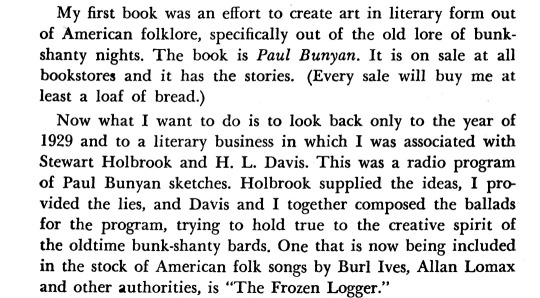
Oregon Historical Quarterly Vol. 50, No. 4 (Dec., 1949) pp.235-242
it's possible that the song was performed by Ivar Haglund (notable for his prolific seafood themed songs and clam restaurant) in the early to mid 1940s on his radio show "Around the Sound" where he would sing folk music for 15 minutes, and I found a couple sources listing him as either the copyright owner of the song, or the writer (he did not write the song). He was friends with Jim Stevens, and it's likely that Stevens taught him the song.
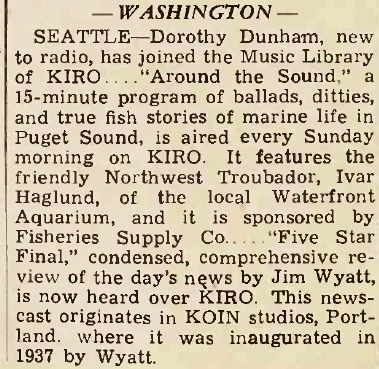

Radio Daily, July 1944 and KJR flyer, 1942
Many secondhand sources mentioned that "The Frozen Logger" was based on an old tune or an old ballad, with words that were originally written by Jim Stevens, including Jim Stevens himself though he's not specific. I think i might be the first person ever to point out that the ballad it was based on belongs to the folk song family of "The Unfortunate Rake"/ "The Unfortunate Lad" (recorded here in the 1960s and performed by A.L. Lloyd) it has a similar story structure, similar characters, similar rhymes, and similar composition.
in " 'The Unfortunate Rake' and His Descendants" by Kenneth Lodewick, the original song is dated as being from ireland in 1790, and one of its earliest printings was in England in 1850 as a folk ballad

as you might be able to guess if you're familiar with cowboy ballads, this song is also the origin of "Streets of Laredo" or "The cowboys lament" which emerged in the late 1800s from cowhand workers. A cowhand in the late 1870s named Frank H. Maynard has claimed to write the song in 1876 and published his version in "Cowboy's Lament: A Life on the Open Range" in 1911 after it was published in Alan Lomax's "Cowboy Songs and Other Frontier Ballads" in 1910. in my opinion, i think this song could have multiple origins.
the oldest recording i could find was by Harry McClintock in 1928
as an aside, there was also ANOTHER lumberjack version of the song collected by John C. French called "The Wild Lumberjack" from Pennsylvania logging camps dated between 1870-1904/1905. performed here by Kenneth S Goldstein (1960s). This song isn't the origin of "The Frozen Logger" but it's interesting that there are two songs like this.
I believe that "The Frozen Logger" is an adaptation from the cowboy version. Jim Stevens grew up in Idaho and worked in Montana (where he mentions learning many songs) and in 1959, he gave an interview with Ivar Harglund about how he used traditional folk and country music and created new and topical lyrics for the Keep Washington Green Campaign in the 1940s
The first ever publishment and recording (That I could find) of "The Frozen Logger" was in 1947 by Earl Robinson in his Keynote Album, commented upon by the Chicago star by Raeburn Flerlage that same year.
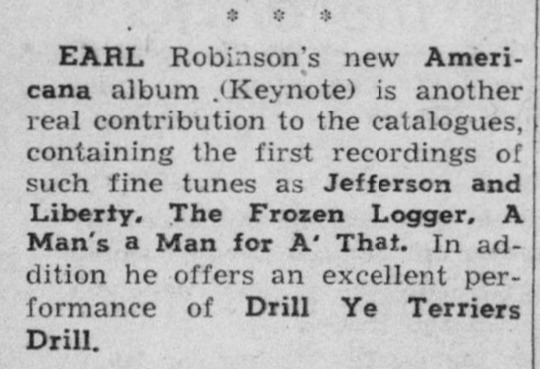
The Chicago Star (Chicago, III.) April 5, 1947 (p.13). Library of Congress
Pete seeger, one of the Weavers, was (for some reason that escapes me) friends with Ivar Haglund (who was friends with Jim Stevens) and, like with the song "the Old Settler" , it is likely that Haglund taught the song to Pete Seeger who then, with the rest of the Weavers, performed it in 1951, popularizing the song.
for @slowtraincumming
#Youtube#Jim Stevens#ivar haglund#harry Mcclintock#alan lomax#pete seeger#the weavers#Frank H Maynard#paul bunyan#cowboy ballads#traditional folk#folk history#american folk#the unfortunate rake#american history#folklore#oregon#Washington#american folk revival#folk#suggested songs
13 notes
·
View notes
Video
youtube
HALLELUJAH! I'M A BUM - Harry MAC McClintock - 1928
"Happy birthday Harry "Haywire Mac" McClintock, singer and writer of this masterpiece, he was mostly a hobo, cowboy, and sometimes journalist, he had a hit with a version of Big Rock Candy Mountain closer to it's x-rated roots than the kiddie versions heard later...."
4 notes
·
View notes
Text
youtube
"Joe Hill wrote a song for the Free Speech fight of 1910, and it was introduced on the streets of Spokane by Haywire Mac McClintock. He was a branch secretary [of the IWW] then, he wrote "Big Rock Candy Mountain" and "Hallelujah, I'm a bum!". He got together a little band: T-Bone Slim, a tuba, a garbage can lid. They stood in a doorway waiting to leap out at the unemployed throng, regale them with song.
They used a shill to build the crowd, you know, a carny shill? Somebody who uses tricks to build a crowd? His name was Tresca, he wore a black suit, a black bowler hat, a string tie with an umbrella and a briefcase. Looked like a banker.
He walked down where they were hiding in the doorway and suddenly he started to yell "Help! Help! Help! I've been robbed! Help! I've been robbed!". Everybody'd run across the street, "what's the matter, what's the matter". Soon as he got the crowd together, he yelled: "I'VE BEEN ROBBED BY THE CAPITALIST SYSTEM, FELLOW-WORKERS!"
He talked to them for ten minutes, and then the boys would leap out and start singing, and this is what they were singing."
Utah Phillips - The Preacher and the Slave ("Pie in the Sky")
Long-haired preachers come out every night To try to tell you what's wrong and what's right But when asked about something to eat They will answer in voices so sweet
You will eat, bye and bye In that glorious land in the sky [Way up high!] Work and pray, live on hay You'll get pie in the sky when you die [THAT'S A LIE!]
The Starvation Army they play And they shout and they clap and they pray When they've got all your coins on the drum They will tell you when you're on the bum
You will eat, bye and bye In that glorious land in the sky [Way up high!] Work and pray, live on hay You'll get pie in the sky when you die [THAT'S A LIE!]
Working folks of all countries unite Side by side we for freedom shall fight When this world and its wealth we have gained To the grafters we'll sing this refrain
You will eat, bye and bye When you've learned how to cook and how to fry [How to fry!] Chop some wood, it'll do you good And you'll eat in that sweet bye and bye [THAT'S NO LIE!]
full lyrics, from the 1911 edition of the IWW’s Little Red Songbook, here
#this is done Baptist style#are there any Baptists here? OH GOOD#The Preacher and the Slave#Utah Phillips#Harry McClintock#Joe Hill#folk#IWW#Wobblies#the phantom of liberty#prison ballads#applause for Tresca please#deception
16 notes
·
View notes
Photo

8:00 AM EDT May 20, 2024:
Harry McClintock - "Big Rock Candy Mountain" From the Soundtrack album O Brother, Where Art Thou? (December 5, 2000)
Last song scrobbled from iTunes at Last.fm
4 notes
·
View notes
Text
Absolutely spiraling about this song (“Fentanyl” by Jesse Welles) clearly referencing/mimicking the song “The Big Rock Candy Mountain” by Harry McClintock to such affect.
6 notes
·
View notes
Text
“I don’t like work and work don’t like me.”
5 notes
·
View notes
Text
Haywire Mac and The Big Rock Candy Mountains
Haywire Mac (Harry McClintock, 1884-1957) cleaned himself up for that photo above. Normally you see him in cowboy or hobo gear, and it wasn’t really a costume. He was a folk singer not unlike Woody Guthrie or Burl Ives though rougher and plainer and more prototypical than those entertainers. He really was of the “folk”, i.e. the singing and songwriting was just what he did for fun and…
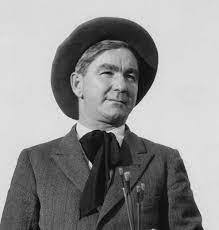
View On WordPress
#Big Rock Candy Mountain#folk#Hallelujah I&039;m a Bum#Harry McClintock#Haywire Mac#music#radio#singer#songs
0 notes
Text
Day 3
Song of springtime:
I think this song has the feeling of springtime, there’s a lightness to it that feels like melting snow and stepping into warm sunlight to escape the chilly shadows
0 notes
Text
I can't believe I fell in love with a fictional character once again. I mean, get yourself together, dumbass
#harry potter hogwarts mystery#hphm#hphm callum#Callum McClintock#he's just so dreamy.....#if I can't date him imma WRITE about it
3 notes
·
View notes
Text

How do you feel about partnering with me?
I'm excited


I'm not happy
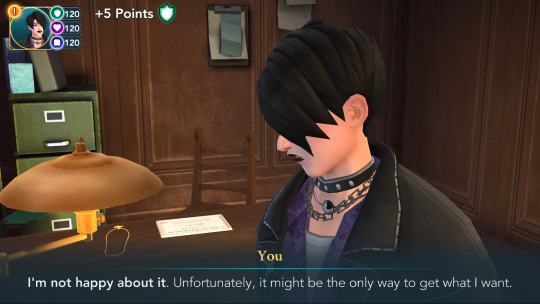
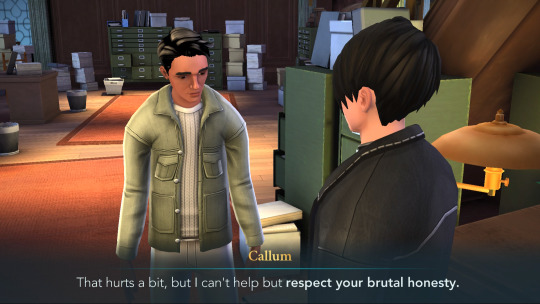
I'm nervous
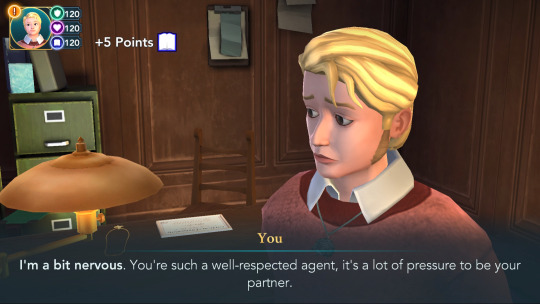

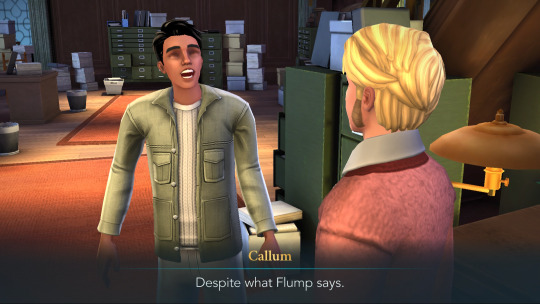
#hogwarts mystery#hphm#harry potter hogwarts mystery#jacob's sibling#mc#harry potter hogwarts game#hphm spoilers#hogwarts mystery spoilers#callum mcclintock#character: douglas hawkins#character: constantinos brakus#character: bucky hensletter
9 notes
·
View notes
Video
Harry McClintock ~ Big Rock Candy Mountain
1 note
·
View note
Text
Song of the Day
do you want to know the history of a folk song? submit an ask or dm me and I'll cover it
youtube
"Great Historical Bum" Odetta, 1960
Originally written in 1941 by Woody Guthrie for his Columbia River Song collection. That time when Woody Guthrie (a socialist) was commissioned by the US federal government (at the recommendation of Alan Lomax. to write folk songs in support of the Coulee Dam in 1941. Woody Guthrie was in poverty at the time and was happy to finally have a job. During the month he traveled through Oregon and wrote a song every day, including "Pastures of Plenty" and "Roll on Columbia".
the lyrics in these songs, including this one, include radical themes like working-class rights, unions, anti-fascism, and anti-capitalism. because of this and because Woody Guthrie was an anti-capitalist, the songs and the documentary they were made for were ordered destroyed by the Eisenhower administration. luckily the recordings were saved by a proletarian comrade: a former employee of the Bonneville Power Administration, who decided to keep a copy of the film and recordings.
youtube
this song may also be inspired by another traditional song recorded in 1928 by Harry McClintock , but I'm not sure.
I like this cover by Odetta quite a bit. I think she does the original one justice.
#woody guthrie#odetta#alan lomax#harry mcclintock#folk#folk revival#american folk#folk music#folk history#socialist history#anti capitalism#union history#american history#women of folk#antifascist#leftist#protest folk#struggle folk#socialism#anticapitalist#Youtube
8 notes
·
View notes
Text

This Is Our Wilderness: A Song Cycle for Drift's Exile
Ahhhhhh remember my human AU EoS fanmix that I said I'd post three years ago? Here it finally is. Join me for some lonely desert yearning.
Dire Straits - The Man's Too Strong
Harry McClintock - Big Rock Candy Mountain
Nick Cave & Warren Ellis - Old Time
Vieux Farka Touré - Savanne
Richard Thompson - So Ben Mi Ch'a Bon Tempo
SQÜRL - Spooky Action at a Distance
Wovenhand - Blue Pail Fever
Dirty Three - At the Bar
Night Beats - Thorns
West Coast Pop Art Experimental Band - I Won't Hurt You
Nick Cave & The Bad Seeds - Night Raid
Wovenhand - Crystal Palace
287 notes
·
View notes
Text
What song did you personally like the best out of this round? Did a song make an impact right away or did it require the full version? Did the artist reveal change your opinion for better or for worse? Tell me in a reblog! :D
(note: this is not a popularity contest or to vote for a favourite artist out of loyalty 💖 it's still about the song.)
148 notes
·
View notes
Photo
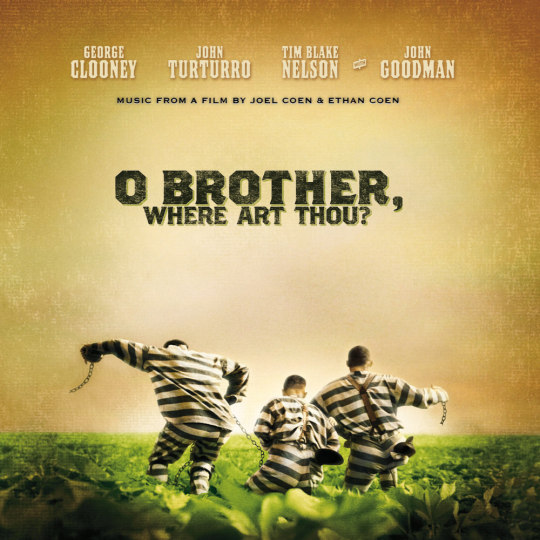
6:04 PM EDT May 6, 2024:
Harry McClintock - "Big Rock Candy Mountain" From the Soundtrack album O Brother, Where Art Thou? (December 5, 2000)
Last song scrobbled from iTunes at Last.fm
5 notes
·
View notes